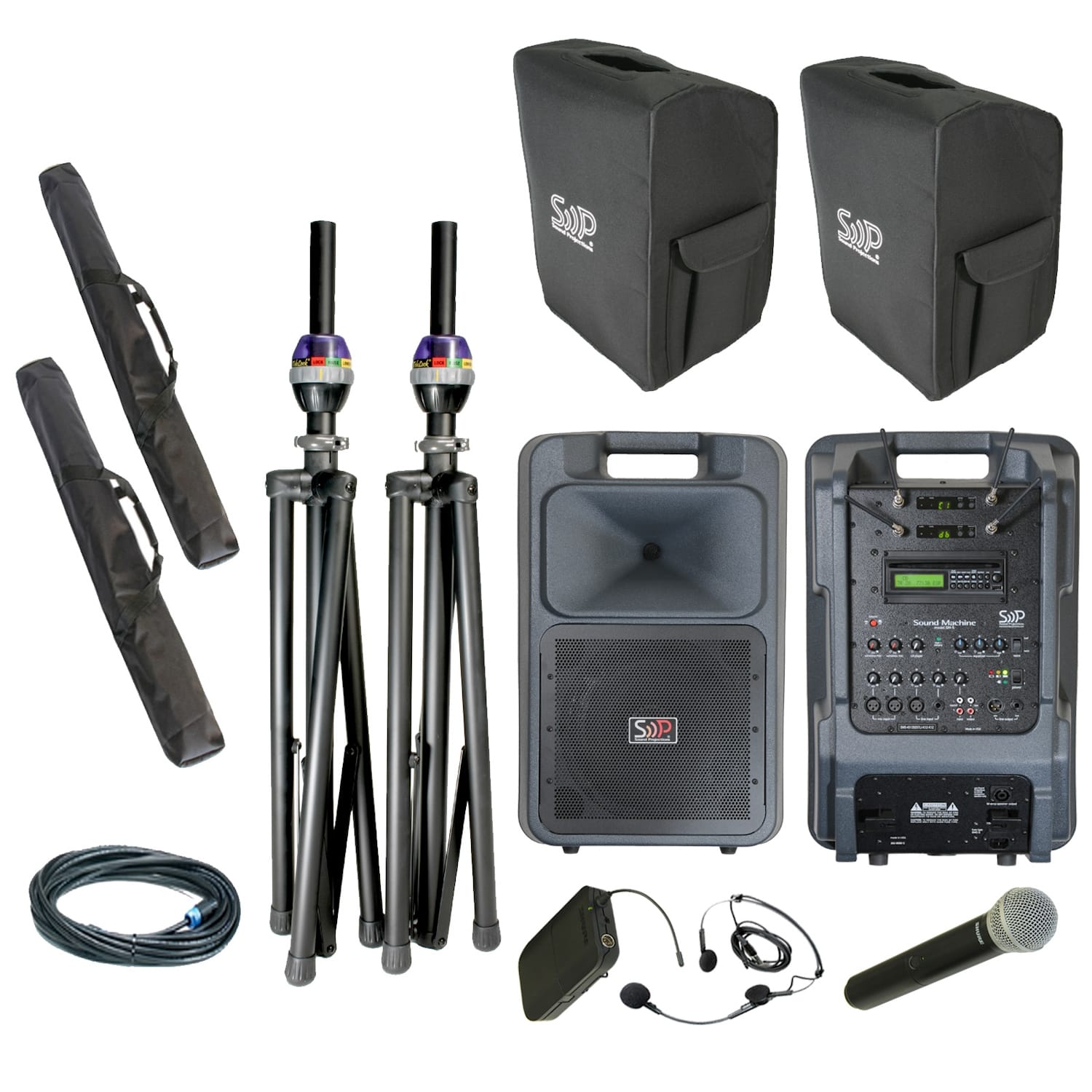What Features are Important?
Advice about how to pick a sound system for your marching band or performing group.
Buying a Portable PA Sound System is a very important decision for a band director, athletic department or anyone else who needs the portability and reliability of a quality system.
Sound Projection Voice Machine Basic PA Sound System
According to Brian Stith, National Sales Manager at Sound Projection, these are things to consider when purchasing a portable system:
What type of battery?
Lead Acid Battery:
Most systems offer a standard lead-acid battery similar to a motorcycle battery. The pros are that it is an inexpensive battery. The cons are the battery is heavy (typically 7-10 pounds), last for approx. 150 charging cycles, and if left on the shelf unplugged for a few months in storage, the battery could die (like not starting your car for a few months).
Lithium Iron Phosphate (LFP):
Sound Projections offers the LFP battery in both the SM-5 and VM-2 system. The con is that it is a more expensive battery than the Lead Acid. The Pros are that the battery is lightweight (2-4 pounds), last for approx. 2,000 charges (10 times the lead acid), and if left unplugged for a year, the battery simply needs to be charged and it is back to full capacity.
How loud does the system get?
To ask how loud a system is, typically somebody asks, “How many watts is it?” But the correct question to ask is, “How many decibels does it produce?” Watts simply tells how much power is needed/used to create the sound, decibels (db) is what we actually hear. In human hearing, a 10db increase is perceived as being twice as loud. For example 90db is twice as loud as 80db. A sound system should be at least 10bd louder that the competing sound.
A 100 piece High School marching band plays at approximately 110db, so the sound system should have a db output of at least 120db to easily compete. If the sound system is rated below 120db, it could be difficult for the students to hear the director.
Clarity of the system:
When having a conversation Americans listen to consonants. The proof is to look at any personalized license plate. Consonants are shown, we fill in the vowels. The consonants are in the upper frequency range of what we hear, so a sound system should produce clear sound in that range, especially for band directors on a football field. The portable system should have a real “horn driver”, not a tweeter, and preferably be bi-amped (2 amps –1 for horn, 1 for full range speaker). Having an electronic crossover to separate the frequencies, and an independent amplifier for just the horn will give clean/clear sound over a large outdoor area such as a football field.
Wireless Systems:
There are a number of considerations when looking at the wireless system in the portable unit, but when it comes down to it there are 3 that are very important.
Type of antenna on the receiver:
The receiver will have either internal or external antennas to receive the signal from the transmitter. Internal antennas have a range of about 150 feet, external antennas have a range of at least 350 feet in an open environment. Interference from instruments and the number of students between the transmitter and receiver could cause the distance to be cut in half. This means that a director using a system with internal antennas could have signal dropout problems when they are less than 100 feet from the unit. Systems with external antennas would allow the band director to be at least 200 feet away from the system without fear of dropout.
Wireless frequency agility:
Most wireless systems transmit on the same UHF frequency as digital (HD) TV stations. Assuming the wireless is UHF, it should have the ability to change frequencies over a number of UHF channels to protect against interference from other wireless systems and local TV stations. The Shure BLX 123-channel wireless system that is used in both the SM-5 and VM-2 can auto-scan all 123-channels and has a range of 5 congruent UHF TV stations.
There are areas in the US with so many HDTV stations and peripheral Radio Frequency (RF) noise that any UHF wireless would have very limited distance and would be unacceptable to a band director. In those cases, a system that can incorporate a “digital frequency” (900 mhz) could be used in place of UHF. Digital wireless systems have their own issues, but when compared to UHF wireless limited range in certain areas, it can be a far superior alternative.
Wireless digital display:
Because of the need to change channels quickly due to outside interference, the wireless receiver should have a digital display to let the band director know exactly which channel he is on, and what channel he needs to program is transmitter to. Having a system that auto-scans the area for the best frequency is also a major benefit.
Where is the system built, and what is the warranty:
The sound system is one of the most important investments. A band director/school that is using a system on a daily basis should purchase a professional system. Do not purchase a home stereo system or a system at a big box store because it’s cheap. A proper professional system can run a few thousand dollars. This is an investment that should last for many years, however, sometimes things happen and parts break so being able to repair the system quickly is just as important as the initial investment. Purchasing an American Made system should be a high priority. The manufacture should be easily available for technical support and be able to answer questions over the phone. If the system needs to be repaired, the manufacture should be able to fix and return the product in a timely matter.
Warranty:
A system should have a minimum of a 2 year “bumper to bumper” warranty on all of the items against manufactures defect. Anything less than that, a band director/school runs the risk of spending more money in a short period of time.
Sound Projections has the best warranty available with 6-year systems, 2-year options, and a 3-year warranty on the LFP battery.
Repairs after warranty expires:
Different manufactures have different repair policy. Some manufactures (Sound Projections) will repair the system, after the warranty expires for a nominal fee. Other manufactures usually will not accept a system for repair once the warranty expires.
Visit:
www.soundprojections.com































































